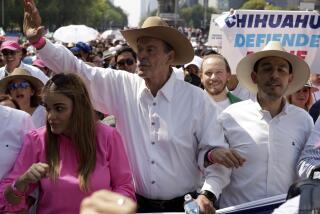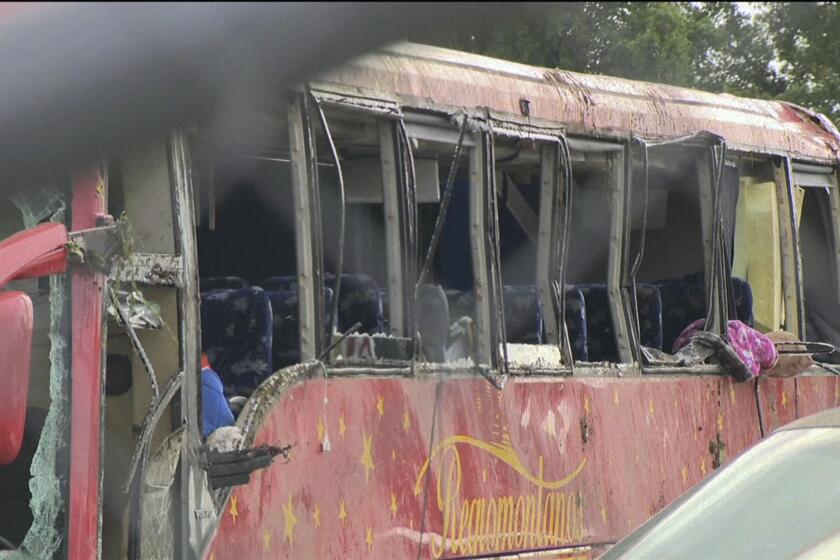Russia’s New Party Boss Is Conciliatory : Soviet Union: Kuptsov says he’ll seek cooperation with Yeltsin. The party’s tattered image needs attention, too.
The new leader of the Russian Communist Party, which has been widely criticized for rallying conservatives against reforms spearheaded by Boris N. Yeltsin, vowed Wednesday to promote cooperation with the Russian Federation’s radical leader and his allies.
“In our practical work,” Valentin A. Kuptsov said, “we shall be looking for ways to cooperate with the president (Yeltsin), his government and the (Russian) Supreme Soviet.”
In replacing arch-conservative Ivan K. Polozkov with Kuptsov, who was moved into the top echelons of Kremlin power by Soviet President Mikhail S. Gorbachev and is considered a centrist, the Russian Communist Party will try to construct a new public image before the next round of elections expected next year. But Russian Vice President Alexander Rutskoi, head of a radical wing of the Communist Party that decided to challenge Polozkov and his comrades for the right to represent Russia’s Communists, warned that the party apparatus is only pretending to change its ways to try to save itself from certain doom.
“They will try to repaint themselves as a ‘democracy’ party,” Rutskoi, who was kicked out of the Communist Party on Tuesday, told a small group of reporters gathered in his office. “But it won’t work.”
Rutskoi and other pro-reform Communists last week created the Democratic Party of Russian Communists to rival the hard-line Russian Communist Party as the main representative of the republic’s Communists. Both the attempt at a facelift by hard-liners and the split between liberal and conservative Russian Communists indicate the depth of the internal problems facing the floundering party.
Although it still controls the military, KGB and the Interior Ministry, elections over the last year have greatly decreased the Communist Party’s control over society as voters have opted for reformers in the Yeltsin mold.
The party’s weakness was never so clear as earlier this summer when Yeltsin, who had quit the party a year earlier, overwhelmingly defeated four Communists to become the first popularly elected president of Russia. Non-Communists were also elected mayors in Russia’s two largest cities, Moscow and Leningrad.
Last month, Yeltsin further wounded his ex-comrades by decreeing that all party organizations at workplaces must be dissolved. As a result, most party members will have to re-register with territorial Communist Party organizations based on where they live.
Party officials admit that they may lose a great number of members who simply will not bother to re-register.
The Communist Party is also suffering from an exodus of members to the dozens of new political parties in Russia. If the new Democratic Party of Russian Communists tells its members to turn in their Communist Party cards, the Communists could end up playing a minor role in Soviet politics for the first time since the Russian Revolution.
“It is perfectly obvious that the change of the Russian Communist Party leadership signified an attempt to bolster its weakening position and remove the label of a conservative organization, to which it had firmly clung,” the official Tass news service said.
In his first meeting with journalists as leader of Russia’s Communists, Kuptsov accused the Democratic Party of Russian Communists of committing an inexcusable act by trying to divide the party, and he defended the decision to boot its leader, Rutskoi, from party ranks.
“If you start a new party, you can’t remain in the old party. You cannot be a member of two parties,” said Kuptsov, a relative political unknown who has many of the traits of the typically bland Communist bureaucrat. “(Rutskoi) made his own choice.”
But Rutskoi said he plans to challenge his dismissal and added that he hopes Gorbachev, the secretary general of the national Communist Party, will realize that the new party merits his support.
“Our platform coincides 100% with the platform of the Communist Party of the Soviet Union,” he said. “We have not broken with Mikhail Sergeyevich Gorbachev.”
If, however, the decision is not overturned, he and millions of Communists who support radical democratic reforms will be forced to abandon the Communist Party, Rutskoi added.
Kuptsov ridiculed estimates that the Democratic Party of Russian Communists could attract a large percentage of the 8 million Communists in Russia.
“To prognosticate, as Rutskoi did, about 5 million people joining him is a super-optimistic assessment by an inexperienced leader,” Kuptsov said.
Despite his antagonistic stance toward Rutskoi’s reformist faction, Kuptsov stressed that under him, Russia’s Communists will concentrate on working with other political organizations and elected officials. In his previous job, Kuptsov was in charge of the Communist Party hierarchy’s outreach program to other political movements.
Kuptsov’s conciliatory strategy may not be enough to win over many voters, but a less confrontational Russian party could ease the political tensions long enough to enable Gorbachev and Yeltsin to push their democratic and free-market economic reforms ahead.
More to Read
Sign up for Essential California
The most important California stories and recommendations in your inbox every morning.
You may occasionally receive promotional content from the Los Angeles Times.






